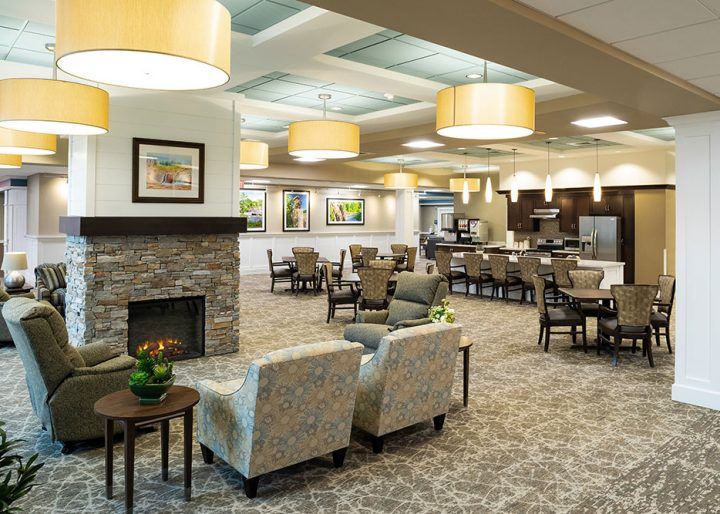Compare Memory Care programs for families seeking compassionate support.
Compare Memory Care programs for families seeking compassionate support.
Blog Article
Recognizing How Helped Living Sustains Individuals With Dementia Treatment Demands
Aided living facilities are significantly identified for their critical function in dealing with the complicated care demands of clients with dementia. Memory Care. By supplying an organized yet nurturing setting, these centers not only advertise safety and security and health but also cultivate a feeling of autonomy with individualized care strategies. Involving tasks and socialization possibilities are indispensable to improving cognitive feature and emotional wellness. Nonetheless, the nuances of exactly how these components connect to develop a supportive community warrant better exam, specifically in recognizing their long-term effect on residents' quality of life.
Summary of Mental Deterioration Treatment
Mental deterioration treatment is progressively crucial as the prevalence of dementia-related problems climbs among maturing populaces. The condition can vary substantially in its discussion, calling for customized care approaches to fulfill specific demands.
Reliable dementia care involves a multidisciplinary strategy, integrating clinical, mental, and social assistance. Healthcare experts, caregivers, and relative have to work together to create a caring setting that promotes the health of people with mental deterioration. Key components of dementia care include personalized treatment plans, cognitive stimulation treatments, and behavior interventions intended at enhancing top quality of life.
In addition, it is essential to identify the psychological and mental challenges encountered by both clients and caregivers. Education and learning and training for caregivers play a critical duty in promoting understanding and compassion, thus boosting communications with those impacted by mental deterioration. As the need for mental deterioration care remains to increase, the emphasis must stay on supplying compassionate, person-centered care that respects the self-respect and preferences of people coping with this problem.
(Dementia Care Charlotte)
Role of Assisted Living Facilities
Aided living facilities play a vital duty in giving care for individuals with dementia, providing an encouraging atmosphere that stabilizes freedom with the required assistance. These centers are designed to satisfy the distinct requirements of residents, advertising a feeling of area while guaranteeing safety and well-being.
In an assisted living setup, skilled team member supply 24/7 assistance, helping with day-to-day tasks such as showering, dressing, and medicine monitoring. This level of treatment is essential for people with dementia, who may deal with these jobs due to cognitive decrease. In addition, facilities commonly incorporate memory-enhancing programs and social tasks tailored to promote cognitive performance and motivate social interaction.
The physical atmosphere of assisted living facilities is likewise enhanced for safety and security, including safe and secure entries, well-lit paths, and clear signs to assist homeowners browse their surroundings. Additionally, these areas foster a feeling of belonging, reducing the sensations of isolation that people with dementia might experience.
Personalized Treatment Plans
To guarantee read this that each resident gets the most ideal treatment, personalized care strategies are important in assisted living centers for people with mental deterioration. These strategies are tailored to fulfill the distinct requirements, preferences, and difficulties faced by each homeowner, promoting their dignity and lifestyle.
The development of a personalized care plan typically starts with a comprehensive assessment carried out by healthcare experts. Assisted Living. This assessment assesses the individual's cognitive capacities, physical health, emotional well-being, and social preferences. Input from family participants and the resident themselves is crucial, as it offers beneficial understandings into their history, regimens, and personal interests
Once the evaluation is complete, a multidisciplinary group collaborates to create a treatment plan that lays out certain goals and treatments. This might include drug monitoring, daily living aid, and behavioral approaches tailored to mitigate anxiety or anxiety.
Regular reviews and updates to the care plan ensure it stays appropriate as the individual's problem progresses. Memory Care. By focusing on personalized care, aided living centers can enhance the total well-being of citizens with dementia, promoting a setting that respects their originality while resolving their treatment needs effectively
Engaging Tasks and Socializing
Engaging activities and socializing play a vital function in enhancing the lifestyle for homeowners with dementia in assisted living facilities. These activities are created to promote cognitive feature, advertise emotional well-being, and foster links amongst residents. Organized programs, such as art treatment, music sessions, and reminiscence therapy, provide possibilities for individuals to share themselves artistically while also triggering favorable memories.
Socializing is just as critical, as it fights feelings of isolation and loneliness that can go along with dementia. Group activities, including games, group trips, and public eating, motivate interaction and aid residents build encouraging partnerships with peers and caretakers. This sense of neighborhood not only improves their day-to-day experiences however also adds to a much more steady psychological atmosphere.
Moreover, involving activities can be customized to individual choices and cognitive levels, making certain that each resident can participate meaningfully. By creating a setting that prioritizes involvement and social interaction, helped living centers can substantially improve residents' general psychological health, cultivating a sense of purpose and belonging. Eventually, these initiatives are crucial elements of extensive mental deterioration treatment, significantly affecting locals' overall wellness and joy.
Benefits of Community Assistance

Furthermore, neighborhood support advertises social communication, which is vital for cognitive and psychological wellness. Engaging with peers and joining group activities can improve mood and encourage reminiscence, adding to a greater sense of belonging. This social involvement is essential, as loneliness and isolation can aggravate cognitive decline.

(Charlotte Alzheimer's Care)
Conclusion
In conclusion, assisted living centers serve as essential environments for people with dementia, providing organized support that fosters both self-reliance and safety and security. The execution of individualized care strategies guarantees that each homeowner's unique requirements are met, while involving activities promote social interaction and cognitive interaction.
Report this page